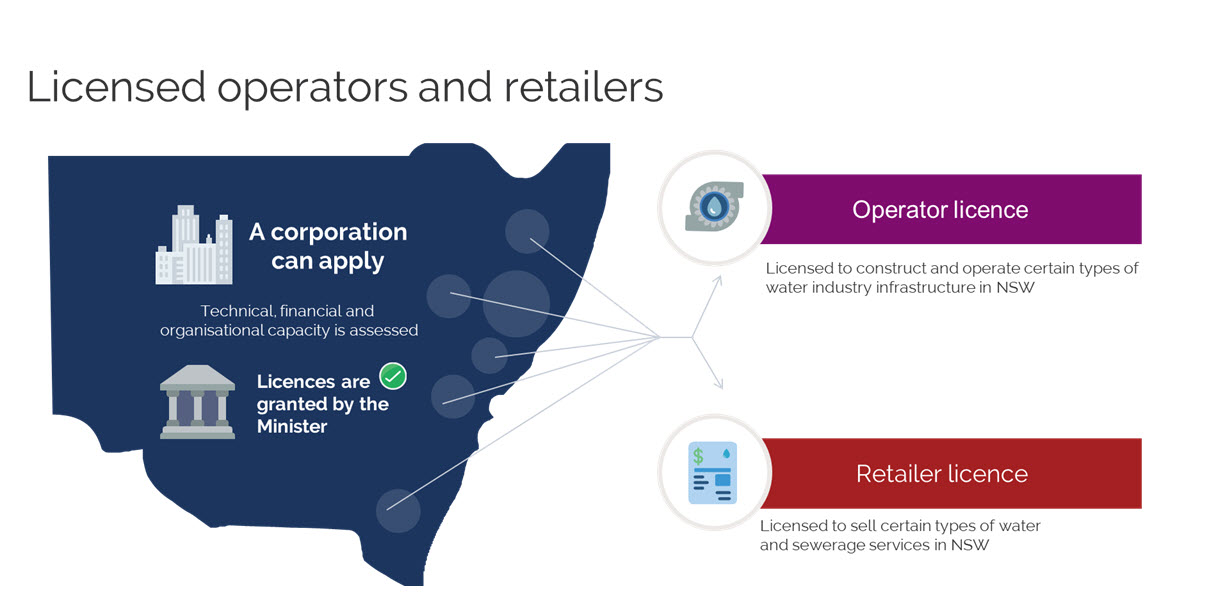
Changes to the Water Industry Competition Act 2006
On 1 March 2024 substantial changes were made to the Water Industry Competition Act 2006 (WIC Act) after the commencement of the Water Industry Competition Amendment Act 2021 and the Water Industry Competition (General) Regulation 2024 (WIC Reg). We refer to these changes as ‘new WICA’.
From 1 March 2024, there is a 12-month transition period for the transitioning of existing licences to new WICA. Licensees should read our Fact Sheet on transition
Operator and retailer licences will become state-wide, not scheme specific
The new framework made the following significant changes to the WIC Act:
- There are new state-wide operator and retailer licences, and separate approvals to construct and operate each scheme. Licences are approved by the Minister and approvals by IPART.
- The operator licence authorises the licensee to construct and operate certain types (classes) of water industry infrastructure and specifies the maximum number and scale of the authorised schemes.
- A retailer licence authorises the sale of water and sewerage services for schemes supplying services to small retail customers (i.e. residential or small business customers) and specifies the maximum scale of the authorised schemes.
- Each scheme has a separate scheme approval which authorises construction of a scheme by a registered operator.
- The scheme approval specifies the area of operations, the location of infrastructure, the class and design capacity of infrastructure, and the purpose and staging of the infrastructure.
- The registered operator needs an operational approval to start operating the scheme once it has been constructed.
- Licences and approvals can be varied, for example if an operator seeks to change the class, number, or scale of schemes or infrastructure it is authorised to construct and operate.
Last resort arrangements are now required for essential services
- A last resort provider is designated by the Minister to step in to provide an essential service should the licensed operator or retailer fail (e.g. because of insolvency).
- Contingency plans are prepared by either the last resort provider or the essential service provider (i.e. licensee) to assist the last resort provider to step in to replace the failed operator or retailer in a last resort event.
Other new provisions help IPART protect customers
- A deemed customer contract applies to small retail customers and ensure a standard level of service and customer protection is provided, similar to Sydney Water’s and Hunter Water’s standard customer contracts.
- IPART has expanded auditing, reporting and investigatory functions as well as increased investigative powers and penalties for offences.
Changes have commenced from 1 March 2024
We are making changes to the WIC Act framework:
- Processes are in place to provide for a smooth transition to the new framework for existing licensees.
- Schemes continuing to be regulated under the WIC Act are being transitioned to the new licences and approvals over a 12-month transition period from 1 March 2024.
- Some existing schemes will no longer be regulated under the WIC Act and at the end of the transition period will be regulated by local councils under the Local Government Act 1993. We will work with the affected councils and licensees to hand over these schemes.
- There are new application forms and guides for retailer and operator licences, scheme approvals and operational approvals.
- There is a new application fee structure and a new annual licence fee structure that applies from when licenses are transitioned to the new framework.
- There is a new Scale Guide and new Design Capacity Guideline which can be used by applicants to identify the appropriate design capacity and maximum scale of infrastructure or services in their licence or scheme approval applications.


